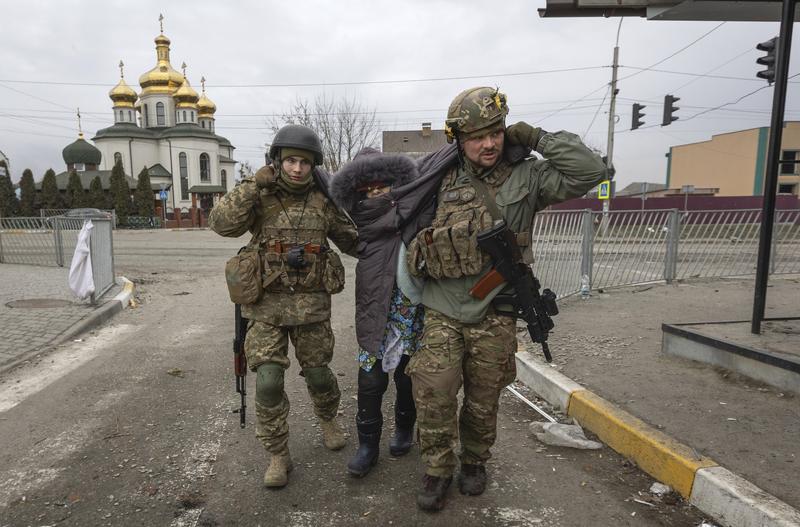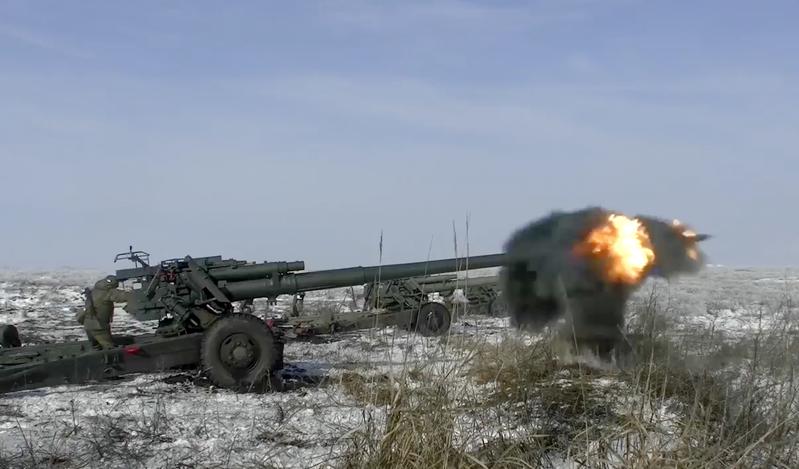 Ukrainian servicemen help an elderly woman in the town of Irpin, Ukraine, March 6, 2022, as Russian troops continued to shell encircled cities and the number of Ukrainians forced from their country continued to grow. (ANDRIY DUBCHAK / AP)
Ukrainian servicemen help an elderly woman in the town of Irpin, Ukraine, March 6, 2022, as Russian troops continued to shell encircled cities and the number of Ukrainians forced from their country continued to grow. (ANDRIY DUBCHAK / AP)
MOSCOW/KYIV/ANTALYA/GENEVA – Russian President Vladimir Putin said Friday that he supported the idea of allowing volunteers from abroad to provide military assistance to Donbass.
Western countries and Ukraine do not hide that they are gathering mercenaries and sending them to Ukraine, Putin said at a meeting with permanent members of Russia's Security Council.
Russian Defense Minister Sergei Shoigu told Putin that he had received "a huge number of applications from various kinds of volunteers from different countries" who would like to come to Lugansk and Donetsk in order to "participate in what they consider a liberation movement."
"The largest number is from the Middle Eastern countries. There are already more than 16,000 applications," Shoigu reported.
ALSO READ: Zelensky signs law on confiscation of Russian property
"If you see that there are people who want on a voluntary basis, especially not for money, to come and help people living in Donbass, you need to meet them halfway and help them move to the war zone," Putin said after listening to his report.
Putin also backed Shoigu's initiative to transfer Western-made weapons captured by the Russian military in Ukraine to the forces of Donbass.
Ukraine sets up 12 humanitarian corridors
Ukraine established 12 humanitarian corridors in four regions on Friday to allow civilians to leave the conflict-torn areas, the Ukrainian government-run Ukrinform news agency reported, citing Ukrainian Deputy Prime Minister Iryna Vereshchuk.
We are making progress on the safety and security of nuclear facilities in Ukraine.
Rafael Mariano Grossi, Director General, IAEA
The humanitarian corridors were set up to evacuate people from some cities and towns in eastern Donetsk and Kharkiv, southern Zaporizhzhya and north-central Kiev, Vereshchuk said.
She added that the Ukrainian authorities also have organized supplies of food and water to civilians in several other regions across the country that were affected by the conflict with Russia.
IAEA chief meets Ukrainian, Russian
The chief of the International Atomic Energy Agency on Thursday held meetings with Ukrainian and Russian foreign ministers respectively on nuclear security in a town in southern Turkish province of Antalya, Turkish official sources said Friday.
At the invitation of Turkish Foreign Minister Mevlut Cavusoglu, IAEA Director General Rafael Mariano Grossi arrived in Belek to attend the Antalya Diplomatic Forum that kicked off on Friday, the sources said.
He held separate meetings with Ukrainian Foreign Minister Dmytro Kuleba and Russian Foreign Minister Sergey Lavrov, a source of the Turkish Foreign Ministry told Xinhua.
 In this photo taken from video provided by the Russian Defense Ministry Press Service on Jan 28, 2022, Russian troops fire howitzers during drills in the Rostov region during a military exercising at a training ground in Rostov region, Russia. (RUSSIAN DEFENSE MINISTRY PRESS SERVICE VIA AP, FILE)
In this photo taken from video provided by the Russian Defense Ministry Press Service on Jan 28, 2022, Russian troops fire howitzers during drills in the Rostov region during a military exercising at a training ground in Rostov region, Russia. (RUSSIAN DEFENSE MINISTRY PRESS SERVICE VIA AP, FILE)
Following the talks, Grossi wrote in two successive tweets that his meeting with Kuleba was "important and forward-looking," and that with Lavrov was "constructive and important”. "We are making progress on the safety and security of nuclear facilities in Ukraine," he wrote.
Both Kuleba and the Permanent Mission of Russia to the International Organizations in Vienna confirmed via Twitter that safety and security of nuclear facilities in Ukraine were discussed in the meetings.
READ MORE: Biden announces imposition of energy embargo on Russia
Lavrov and Kuleba held a meeting on Thursday in Belek in the presence of Cavusoglu, the first high-level meeting between Moscow and Kiev since Russia's special military operation in Ukraine started on Feb. 24. The two sides however failed to make progress on a ceasefire but agreed to continue negotiations over the conflict.
WHO: Destroy high-risk pathogens in labs
The World Health Organization has advised Ukraine to destroy high-threat pathogens stored in the country's labs to prevent "any potential spills," the UN agency said on Thursday.
In an emailed response, the WHO told Reuters that it has "strongly recommended the Ministry of Health in Ukraine and other responsible bodies" to destroy those disease-causing pathogens or toxins, but provided no specifics about their kinds.
According to Reuters, Ukraine has public health laboratories working on disease research, and received support from the United States, the European Union and the WHO.
With no reference to biowarfare, the WHO said it encourages all parties to cooperate in "the safe and secure disposal of any pathogens they come across, and to reach out for technical assistance as needed."
Also on Thursday, Dmitry Polyanskiy, first deputy permanent representative of Russia to the UN, tweeted that the United Nations Security Council would convene on Friday to discuss the United States' alleged military biological research in Ukraine at Russia's request.


